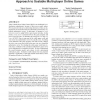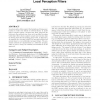115
click to vote
NETGAMES
2004
ACM
15 years 7 months ago
2004
ACM
The emergence of distributed Virtual Reality (VR) applications that run over the Internet has presented networked game application designers with new challenges. In an environment...
112
click to vote
NETGAMES
2004
ACM
15 years 7 months ago
2004
ACM
Large-scale multiplayer online games require considerable investment in hosting infrastructures. However, the difficulty of predicting the success of a new title makes investing ...
NETGAMES
2004
ACM
15 years 7 months ago
2004
ACM
Today’s Multi-player Online Games (MOGs) are challenged by infrastructure requirements, because of their server-centric nature. Peer-to-peer networks are an interesting alternat...
121
click to vote
NETGAMES
2004
ACM
15 years 7 months ago
2004
ACM
We propose a fully-distributed peer-to-peer architecture to solve the scalability problem of Networked Virtual Environment in a simple and efficient manner. Our method exploits lo...
129
click to vote
NETGAMES
2004
ACM
15 years 7 months ago
2004
ACM
Ordering of command messages from the clients at the game servers is an important issue that impacts fairness, response times, and smoothness of the game play. Recently, protocols...
118
click to vote
NETGAMES
2004
ACM
15 years 7 months ago
2004
ACM
In this paper, we present an approach to provide Quality of Service (QoS) for networked mobile gaming. In order to examine the QoS requirements of mobile games, we ported a simple...
NETGAMES
2004
ACM
15 years 7 months ago
2004
ACM
It is usually hard to control the network conditions affecting public online game servers when studying the impact of latency, loss and jitter on user experience. This leads to a ...
126
click to vote
NETGAMES
2004
ACM
15 years 7 months ago
2004
ACM
Mobile devices offer the opportunity to play games nearly everywhere. Moreover, networked games allow individual players to interact with other people and to participate in a larg...
NETGAMES
2004
ACM
15 years 7 months ago
2004
ACM
Local perception filters exploit the limitations of human perception to reduce the effects of network latency in multiplayer computer games. Because they allow temporal distorti...




